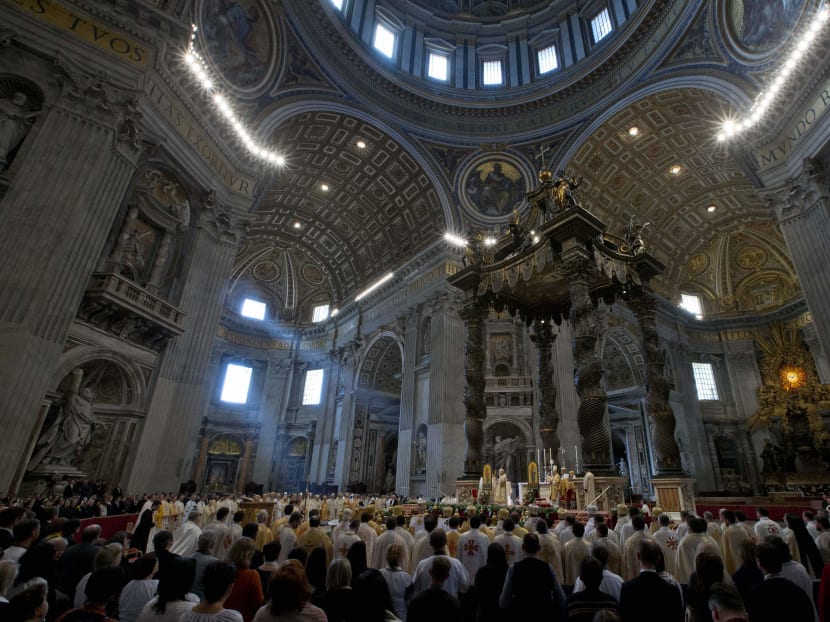Pope Francis issues mission statement, denounces financial system
VATICAN CITY — Pope Francis denounced the global financial system that excludes the poor as he issued the mission statement for his papacy yesterday (Nov 26), saying he wants the Catholic Church to get its hands dirty as it seeks to bring solace and mercy to society’s outcasts.

Archbishop Sviatoslav Shevchuk delivers his speech during a ceremony to commemorate the 15th anniversary of the translation of the relics of St Josaphat to the Vatican Basilica, in St Peter's Basilica at the Vatican on Monday, Nov 25, 2013. Photo: AP
VATICAN CITY — Pope Francis denounced the global financial system that excludes the poor as he issued the mission statement for his papacy yesterday (Nov 26), saying he wants the Catholic Church to get its hands dirty as it seeks to bring solace and mercy to society’s outcasts.
In a 224-page document, Pope Francis pulled together the priorities he has laid out over eight months of homilies, speeches and interviews, pushing to shift the church away from a focus on doctrine to one of joyful welcome in a bid to draw in believers in a world marked by secularisation and vast income inequalities.
The document, Evangelii Gaudium, (The Joy of the Gospel), is the second major teaching document issued by Pope Francis, but is the first actually written by him since the encyclical The Light of Faith, issued in July, was penned almost entirely by Pope Benedict XVI before he resigned.
Pope Francis’ concerns are laced throughout, and the theological and historical citations leave no doubt about his own points of reference and priorities: Popes John XXIII and Paul VI, who presided over the Second Vatican Council, which brought the church into the modern world, are cited repeatedly.
And in a first for an apostolic exhortation, as this type of papal pronouncement is called, Pope Francis cited various documents of bishops’ conferences from around the world, an indication of the importance he places in giving the local church greater say in church governance.
In the text, Pope Francis denounced trickle-down economic theories as unproven and naive, saying they are based on a survival of the fittest mentality “where the powerful feed upon the powerless” with no regard for ethics, the environment or even God.
“Money must serve, not rule!” he said in calling for political leaders to reform the system. “The Pope loves everyone, rich and poor alike, but he is obliged in the name of Christ to remind all that the rich must help, respect and promote the poor.”
In a direct challenge to the focus of the past two popes, he also decried the church’s “obsession” with rules and doctrine and said in some cases, the church’s old customs can be cast aside if they no longer serve to communicate the faith.
In the church’s “hierarchy of truths”, mercy is paramount, proportion is necessary, and what counts is inviting the faithful in, he said.
At the same time, Pope Francis restated the church’s opposition to abortion, making clear that the doctrine is non-negotiable and is at the core of the church’s insistence on the dignity of every human being.
The aim of the text was to set out his idea of what the Catholic Church should be, and how its priests, bishops and even the pope must change course to fulfil the task.
“I prefer a church which is bruised, hurting and dirty because it has been out on the streets, rather than a church which is unhealthy from being confined and from clinging to its own security,” he wrote. “I do not want a church concerned with being at the centre and then ends up by being caught up in a web of obsessions and procedures.”
He added: “More than by fear of going astray, my hope is that we will be moved by the fear of remaining shut up within structures which give us a false sense of security, within rules which make us harsh judges, within habits which make us feel safe, while at our door people are starving and Jesus does not tire of saying to us, `Give them something to eat’.”
In the frank and often funny style that has come to define Pope Francis’ preaching, the Argentine Jesuit chastised priests for their complacency, giving them a lesson on preparing homilies that do not put the faithful to sleep. He reminded them that confession should not be “torture”, and told them to get out of their sacristies, get their shoes muddy, get involved in the lives of their faithful and not be defeatist “sourpusses”.
While again ruling out women’s ordination, Pope Francis called for greater role for women in making decisions in the church and said the faithful ought not to think that just because priests preside over Mass that they are more important than the people who make up the church itself.
“The church, as the agent of evangelisation, is more than an organic hierarchical institution; she is first and foremost a people advancing on its pilgrim way towards God,” he wrote.
Pope Francis cited Vatican II documents calling for a more decentralised church authority and said he too must rethink the papacy to achieve the goals of spreading the faith. He noted that Pope John Paul II had asked for proposals to rethink the way the primacy of the pope is exercised, a delicate and potentially revolutionary issue that has not yet been resolved.
Pope Francis is currently overseeing a major overhaul of the Vatican’s dysfunctional administration, but he said that he was “open to suggestions” about how to change the very nature of the papacy and its relation to the world’s bishops conferences, to make the papacy reflect better what Jesus intended and what the church needs today.
“Excessive centralisation, rather than proving helpful, complicates the church’s life and her missionary outreach,” he said. AP






